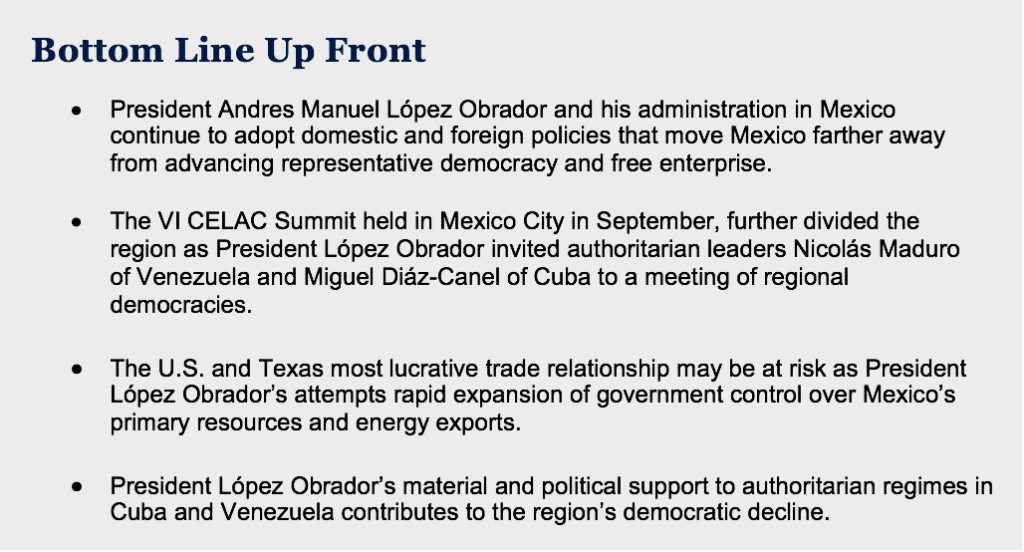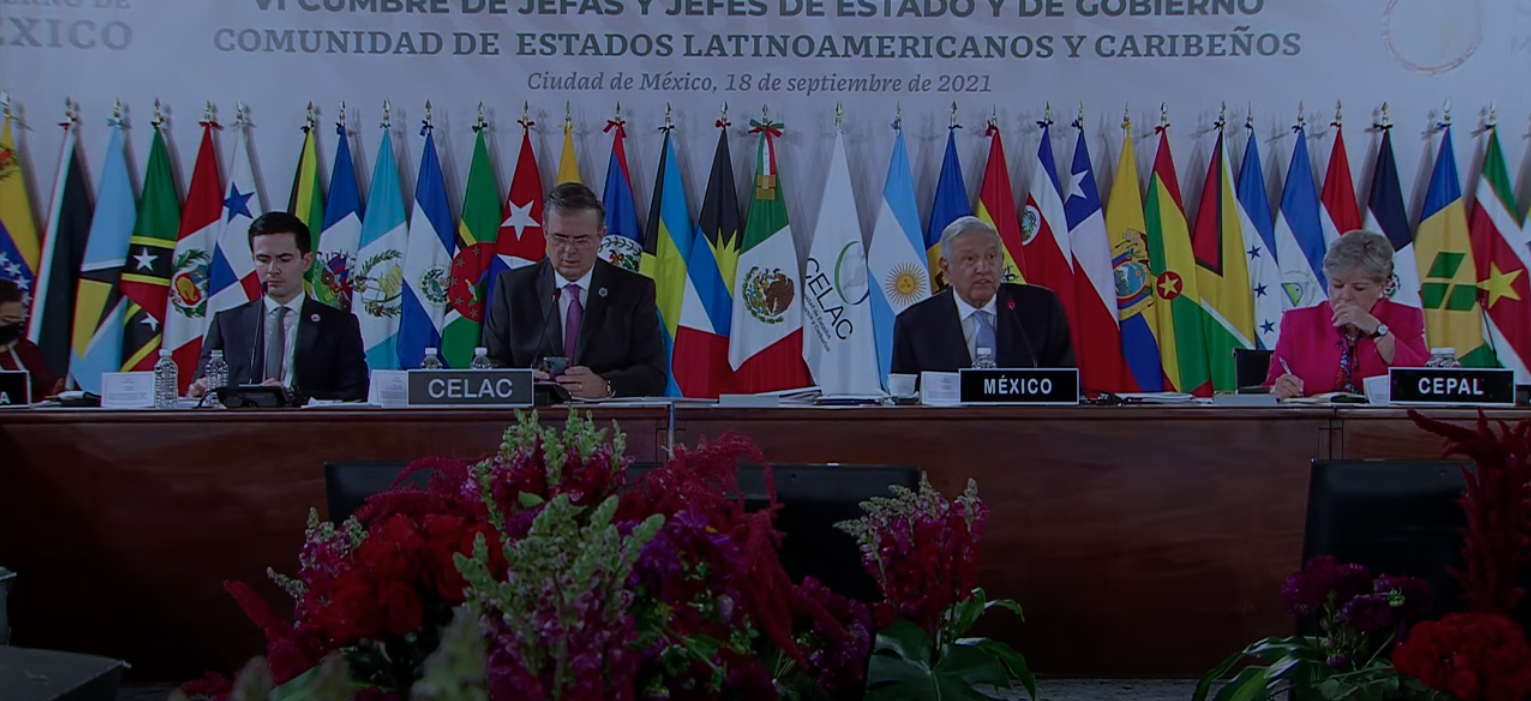EXPERT
Locations
DOWNLOAD
Transregional Threats Journal
Texas Series • Issue 7
Mexico’s alarming turn away from democracy and free enterprise

The single largest trade partner of both the United States and Texas is emerging as the leading regional partner of authoritarian regimes in Latin America and the Caribbean.[1] The Mexican administration under President Andres Manuel López Obrador, known as AMLO, has not only ramped up efforts to legitimize and support communist governments in the region but has pursued domestic reforms that would shift Mexico’s political trajectory decidedly toward more government control of industry.
AMLO’s penchant for socialist ideas and alliances has been a cause for concern of democratic nations in the region since before he was inaugurated in 2018. Those concerns now appear well-founded. A comprehensive look at his recent domestic policies, rhetoric, and foreign relations shows the arc of AMLO’s political agenda bending decisively toward America’s adversaries.
AN ELECTION STOPPED RADICAL DOMESTIC PLANS
The June 2021 legislative elections in Mexico did not deliver the supermajority in congress that AMLO needed to push through his domestic agenda. His political party, MORENA, could only maintain their simple majority.[2] Although this setback stymied the advance of AMLO’s domestic policies, it remains important to understand what he was attempting to do because those policies have profound implications for Texas and the United States.
Prior to the midterms, AMLO proposed and Mexico’s Senate approved a presidential recall amendment to the constitution that some feared could be a slippery slope toward extending presidential term limits.[3] The Mexican constitution only affords a president one six-year term. AMLO was quick to sign a document stating he vowed to step down once his term ends. Several experts, however, remained skeptical, particularly after the Senate’s April 15 vote to extend the term of the president of Mexico’s Supreme Court for an extra two years.[4] AMLO’s political party MORENA; however, did not gain the supermajority it needed in Mexico’s Congress to potentially make any changes to presidential term limits.[5]
Altering term limits is a textbook socialist strategy used by authoritarians in Latin America whose desire for radical change is hampered by democratic systems. Venezuela’s Hugo Chávez, for instance, attempted a new constitution without term limits immediately after his presidential victory in 1999. He finally achieved it in 2009.[6] A Chávez ally, Daniel Ortega of Nicaragua, had a supportive legislature to approve a third successive term in 2016.[7] Term limits alone are not sacrosanct. But for burgeoning authoritarians, anything that interferes with their stay in power is a target.
There are several reasons why term limits are often high on the list. First, incumbents are difficult to unseat. To become a routine incumbent means a greater likelihood of future victory, especially where there are high levels of corruption. Second, extended-term limits provide time to entrench allies throughout government and provide near-permanent support to incrementally implement otherwise drastic policies. Finally, a president’s longer stay in power creates a more centralized government. In that environment, preferred policies are swiftly adopted and any policies that might threaten power are almost never considered as the checks and balances in representative democracies are significantly weakened.
Meanwhile, the AMLO administration’s agenda for Mexico’s energy and utility sectors indicate his intent to limit competition and increase government control over those sectors. Over $9 billion has been invested in a new oil refinery, which is operated by the state-owned Petroleos Mexicanos or Pemex. As is often the case with government projects, this one is running behind schedule and over budget with working conditions that recently led to massive protests by laborers.[8] The AMLO government also helped push through legislation that would have essentially favored state-owned companies, like Comisión Federal de Electricidad (CFE), in the energy and utility sectors. Mexican courts temporarily suspended that legislation in March 2021, ruling that, among other things, CFE could not be given priority in the dispatch of electricity over private-sector assets.[9] While the ruling was on environmental grounds and not to protect free enterprise, the story confirms AMLO’s intent to squash competition and expand state control over these industries. Adding up these elements, a logical concern is that AMLO’s domestic agenda is pulling Mexico down that well-worn path to authoritarianism.
After the midterms, once extending term limits is no longer an option, AMLO reiterated that he does not care, on principle, to run for reelection, but that his government cannot waste time in advancing its transformation of the country.[10] It appears this transformation extends to Mexico’s foreign relations, where since May, AMLO has made a visible effort to legitimize and support the Maduro regime in Venezuela and the communist regime in Cuba.
LEADING THE CHARGE AGAINST THE OAS
Mexico recently hosted the VI Summit of the Community of Latin American and Caribbean States (CELAC) – a coming-out moment for AMLO’s political alliances. Mexico as host was certainly a concerning development for the United States since CELAC is the premier political forum established in 2011 by then-President Hugo Chávez as a regional integration project to counter the Organization of American States (OAS) and the United States. But it got worse. AMLO received Venezuela’s Nicolas Maduro to the CELAC summit on September 18, 2021. Recall that Maduro has remained in Venezuela since March 2020 after the United States Department of Justice issued a $15 million reward for his capture, stemming from U.S. drug trafficking charges.[11] AMLO warmly received an alleged narcoterrorist leader, who has been credibly accused of committing crimes against humanity by the United Nations, much to the consternation of other CELAC member nations, such as the presidents from Paraguay and Uruguay.[12]
AMLO also used CELAC as a platform to appeal to the region’s authoritarians. The Mexican leader demonized the OAS as “an imperialist tool” and said there needed to be a new body that is “truly autonomous, not anybody’s lackey,” while ironically praising the extra-regional presence of China, which is the primary enabler of CELAC.[13] AMLO went on to call Cuba’s endurance under U.S. sanctions an “example of resistance” and blamed the U.S. “blockade” as the source of Cuba’s economic problems.[14] He never made mention of the consequences of socialist policies on the island, the Cuban regime’s oppression of its people, or the status of Venezuela and Cuba as lackeys of authoritarians in China, Russia, and Iran.
AMLO’s reverence for the Cuban communist regime does not appear to stop at rhetoric. There were concerns that the Mexican administration allegedly circumvented U.S. sanctions by overpaying Cuba for medical services received during its COVID mitigation measures. Mexican Senator Julen Rementería observed that, besides the excessive payment for services, Cuban doctors sent to Mexico had no credentials and no real experience to speak of.[15] U.S. Senator Bob Menendez (D-NJ) went further, urging the Biden administration to redouble its diplomatic efforts to end what he called the exploitation and trafficking of Cuban doctors and medical professionals to international partners, including Mexico. He argued that the regime in Havana does not comply with international labor and human rights standards with its foreign medical missions’ program.[16] President López Obrador was unfazed. Instead, he invited the Cuban president to take part in the military parade during Mexican Independence Day celebrations.[17]
Similar concerns about sanctions evasion surfaced when it was revealed that the AMLO administration purportedly orchestrated a now-defunct oil-for-food pact in 2019 with the Maduro regime in Venezuela.[18] Evidence appeared to show how a Mexican businessman with close ties to the AMLO administration helped arrange for Venezuelan crude to be sent to India where it was refined and then re-introduced into the Mexican market. The process gave the appearance that the oil was not from Venezuela. The businessman then arranged for the Maduro regime to receive tons of corn, rather than cash. That corn reportedly originated with Segelmex, the AMLO administration’s official food distributor.[19]
The Mexican administration extends other forms of support to the Maduro regime, primarily through logistical assistance to its airlines. Conviasa, the Venezuelan state-owned airline, made up nearly 50 percent of all flights between Mexico and Venezuela in 2021.[20] This is the same airline dubbed “Aeroterror” as far back as 2007 when U.S. narcotics agents compiled information indicating that the Conviasa flights between Caracas and Tehran routinely hauled drugs, cash, weapons, and terrorist operatives.[21]
AMLO’s open alliance with regional authoritarians shows little regard for democracy or for Mexico’s long tradition of non-intervention. His rhetoric and foreign policy reinforce the belief that he sides with those who seek to undermine democratic progress and regional integration.
NOT A NEUTRAL THIRD PARTY
Mexico is the host of the latest negotiations between the Maduro regime and its political opposition aimed at resolving governance issues and the humanitarian crisis in Venezuela. The talks facilitated by Norway, and with Russia, Bolivia, and Turkey aiding the Maduro regime, turned out to be largely one-sided in favor of the Venezuelan regime and its allies.
After the opening rounds of dialogue, two preliminary agreements were reached on September 6, including one to ratify “the defense and sovereignty” of Venezuela over the disputed territory Essequibo, which covers two-thirds of Guyana.[22] That agreement placed the Venezuelan opposition at odds with two of its most important allies, the United Kingdom, and the United States.[23]
The following week, on September 14, the Maduro regime made a greater spectacle of the negotiations by appointing the incarcerated regime super facilitator, Alex Saab, to join the talks in Mexico City as one of Venezuela’s negotiators.[24] That move, likely a last-ditch attempt to stave off the extradition of Saab to the United States to face charges of money laundering, caused observers to question the seriousness of Maduro’s negotiators in Mexico.
The latest round of talks on September 26 looked even more senseless when the Maduro regime’s negotiating team landed in Mexico City with #FreeAlexSaab posters and made a point to use the Venezuela negotiations to promote propaganda instead of engaging in serious dialogue with the opposition. Saab was finally extradited on October 16 into the custody of a federal court in South Florida. The Maduro regime reacted by suspending the Mexico City negotiations and proceeded to return to prison from house arrest the six U.S. citizens and Citgo officials the regime had sentenced in November 2020 under questionable charges of corruption.[25]
To stop a negotiation that had so far proved favorable to the Maduro regime in response to a wholly predictable extradition of an international fugitive suggests the regime never intended to engage in honest dialogue with its political opposition. The fact that AMLO agreed to host the dialogue turned Mexico into the propaganda platform for the Venezuelan regime and helped amplify its disinformation efforts. But then again, the AMLO administration welcomed Maduro himself to Mexico even though he has a pending U.S. arrest warrant, setting a precedent for other Latin American nations to accept Maduro as a legitimate leader.
WHAT’S NEXT?
AMLO’s acceptance of regional authoritarians may induce the failed policies from countries like Venezuela and Cuba, to Mexico. There are signs that this could have already begun in Mexico’s productive energy sector.
Mexico recently discovered what could be the world’s largest lithium deposits in Sonora state near the U.S. border. In early October, President López Obrador sent a package of constitutional reforms to Congress that, if passed, would stipulate that lithium and other minerals deemed strategic for Mexico’s energy transition will come under the control of the government.[26]
This most recent development dovetails with his apparent intent to expand government control over all of Mexico’s primary resources and exports – a possible path toward re-nationalizing the energy sector. Couple that with Mexico’s overt support for authoritarians, like Cuba and Venezuela, and it becomes clear that the United States’ most important trade relationship and its national security hinge on a president who has, thus far, shown no interest in free enterprise or advancing democracy. And the consequences will be felt in Texas first.
Notes
[1] Erin Douglas and James Osbourne, “Tariffs on Mexico could deal a blow to Texas economy,” Houston Chronicle, May 31, 2019.
[2] Andrew Baker, “Mexico’s AMLO loses lower house Supermajority in Largest Ever Midterm,” Natural Gas Intelligence, June 7, 2021.
[3] “Mexican vote in midterm elections seen as referendum on president,” CNBC, June 6, 2021.
[4] “Mexican senators vote to extend term of Supreme Court president,” Reuters, April 16, 2021.
[5] Ibid.
[6] Simon Romero, “Chávez Decisively Wins Bid to End Term Limits,” New York Times, February 15, 2009.
[7] “Nicaragua: Ortega allowed to run for third successive term,” BBC, January 29, 2014.
[8] Nacha Cattan, “AMLO’s $9 Billion Pet Project Hit by Strike, Police Violence,” Bloomberg, October 13, 2021.
[9] Andrew Baker, “Mexico Power Sector Rules Now Halted on Environmental, Competition Grounds,” Natural Gas Intelligence, March 24, 2021.
[10] Pedro Villa y Caña, “Por principio y por convicción”, AMLO no buscará reelección,” El Universal, July 17, 2021.
[11] “Venezuela’s Maduro in Mexico on first foreign trip since US accusations,” Digital Journal, September 18, 2021.
[12] Jamey Keaten, “Experts cite ‘crimes against humanity’ in Maduro’s Venezuela,” AP News, September 16, 2020.
[13] VRIC Monitor, “Mexican President calls Cuba an ‘example,’ wants OAS replaced,” Associated Press, July 24, 2021; VRIC Monitor, “Mexico Moves Closer to Venezuela and Cuba,” Center for a Secure and Free Society, September 24, 2021.
[14] Andres Oppenheimer, “AMLO proposed that Cuba be declared a “World Heritage Site” for being an “example of resistance” against U.S. aggressions (OPINION),” Yucatan Times, July 29, 2021.
[15]Gerardo Garibay Camarena, “Senator Julen Rementería: Mexico Paid Cuban Regime for Unqualified ‘Doctors’,” El American, September 24, 2021.
[16] “Menendez Urges Biden Administration To Help End Mexico, Other Countries’ Participation In The Cuban Regime’s Forced Labor Scheme,” Senate Committee on Foreign Relations, September 21, 2021.
[17] Nora Gámez Torres, “Cuban leader’s Mexico trip highlights challenges for Biden foreign policy in the region,” Miami Herald, September 16, 2021.
[18] “US Asks Mexico for Help to Investigate Oil-for-food Pact with Venezuela,” Voice of America, April 29, 2020.
[19] Carlos Loret De Mola, “El Viaje de Rocío Nahle…y las extrañas coincidenias,” El Universal, September 9, 2021.
[20] Author calculations based on SFS original research on Venezuela-Mexico logistical links.
[21] Josh Meyer, “The secret backstory of how Obama let Hezbollah off the hook,” Politico, December 18, 2017.
[22] “Venezuela political rivals narrow differences at Mexico talks,” France 24, September 7, 2021.
[23] VRIC Monitor, “Mexico Moves Closer to Venezuela and Cuba.” September 2021.
[24] For more on Alex Saab, see SFS SITREP: https://www.securefreesociety.org/research/who-is-alex-saab/ and his appointment to the Maduro regime negotiating team in Mexico City: https://cronica.uno/gobierno-de-maduro-incorpora-a-alex-saab-como-miembro-de-la-delegacion-oficial-en-las-negociaciones-de-mexico/
[25] Deisy Buitrago and Sharay Angulo, “Venezuelan opposition, Norway urge Maduro government to resume talks,” Reuters, October 18, 2021; Jaclyn Diaz, “Citgo Executives Sentenced To Prison In Venezuela,” NPR, November 27, 2020.
[26] David Alire Garcia, “Mexico will reject private lithium deals even if reform bill fails,” Reuters, October 7, 2021; “Mexico: lithium reserved for state, or no concessions at all,” AP News, October 7, 2021.


 David Grantham, Ph.D.
David Grantham, Ph.D.